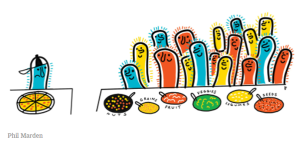Microbe Diversity: the key to good health

Our intestinal bacteria have a tremendous influence on our health. Numbering in the trillions in our digestive tract alone, the important roles these microbes play in digestive, immune, cognitive, and metabolic health cannot be underestimated.
A diverse microbiota is a healthy microbiota. Ideally this means you would have a high number of different bacteria species that are evenly spread across your digestive tract. While there is no one ideal healthy intestinal microbiome composition (because everyone’s microbiota profile is unique to them)1, researchers agree that the key to a resilient digestive system is related to a diverse intestinal bacteria population.
Simple ways to increase and support the diversity of your intestinal microbes:
Get moving

Exercise has many benefits not only for our overall health. Research shows the benefits of exercise in increasing our beneficial bacteria species and in enriching diversity in our intestines. This not only benefits your general health, but a diverse intestinal microbiota may potentially also improve your training performance!2
Embrace nature
Unlike enclosed spaces like the office or school, spending time outdoors can provide us with a much wider diversity of microbes. City dwellers, come take a walk on the ‘nature side’ and your intestinal bacteria will benefit from this. Enjoy the fresh air and get the added benefits of vitamin D from the sun too!
Nourish your microbes

Cartoon by Phil Marden 2016 from The New York Times article: Gut makeover for the new year
To encourage the growth of a wide variety of microbes, provide them with the nutrients to help them thrive.
- Include fermented microbe-rich foods like Yakult, kimchi, sauerkraut, miso, natto, tempeh, kefir, or yoghurt.
Did you know? the Lactobacillus casei Shirota strain (LcS) in Yakult not only increases the numbers of beneficial lactobacillus bacteria in your intestines but also helps encourage the growth of other beneficial native bacteria already living in your digestive system?3
- Increase the varieties of plant food in our meals. Fruits, vegetables, nuts, seeds, and legumes contain fibre and prebiotics, which are our microbes’ favourite foods. By increasing the variety of plant foods in your diet, you help nourish different types of microbes, leading to a more diverse microbial community4.
Tip: Try consuming fruits and vegetables according to their season, to enjoy the different varieties when they are at their best both nutritionally and cost-wise.
- Avoid highly processed foods as these tend to be lower in fibre and prebiotics, which limits the number of nutrients your microbes are exposed to compared to unprocessed foods.
Your wellbeing and community
The scientifically proven link between your gut and the brain is known as the gut-brain axis. Stress has been shown to cause various digestive issues by upsetting the bacterial balance and reducing our intestinal microbe diversity. Therefore, taking time to rest and unwind is important both for our brain and bacteria.
Spending time in the company of people and animals that we love is also good for both the soul and our digestive system. The more people and furry friends (pets/animals) we spend our time with, the greater our microbial diversity5 as we are exposed to their unique microbes.

Help look after your intestinal bacteria, to help them look after you.
Which simple step will you be taking this week to increase your microbe diversity?
References:
- Rinninella E Rinninella E, Raoul P, Cintoni M, et al. What is the Healthy Gut Microbiota Composition? A Changing Ecosystem across Age, Environment, Diet, and Diseases. Microorganisms. 2019;7(1):14
- Clauss M, Gérard P, Mosca A, Leclerc M. Interplay Between Exercise and Gut Microbiome in the Context of Human Health and Performance. Front Nutr. 2021;8:637010
- Nagino T, Kaga C, Kano M, et al. Effects of fermented soymilk with Lactobacillus casei Shirota on skin condition and the gut microbiota: a randomised clinical pilot trial. Benef Microbes. 2018; 9(2):209-18
- Heiman ML, Greenway FL. A healthy gastrointestinal microbiome is dependent on dietary diversity. Mol Metab. 2016;5(5):317-320
- Azad MB, Konya T, Maughan H, et al. Infant gut microbiota and the hygiene hypothesis of allergic disease: impact of household pets and siblings on microbiota composition and diversity. Allergy Asthma Clin Immunol. 2013;9(1):15
